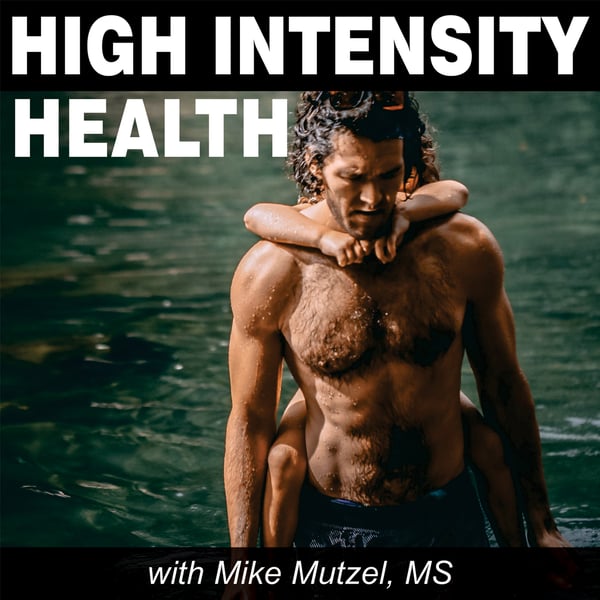LIVE: 'Red Meat Causes Diabetes' Harvard Scientists Claim: Flawed Study Breakdown
High Intensity Health with Mike Mutzel, MS
Mike Mutzel
4.8 • 1.2K Ratings
🗓️ 24 October 2023
⏱️ 25 minutes
🧾️ Download transcript
Summary
Let's discus the latest epidemiological study attempting to vilify meat yet ignoring healthy user bias of study participants.
Support your Workout Sessions and Healthy Hydration with the Electrolyte + Creatine Combo by MYOXCIENCE: https://bit.ly/electrolyte-stix
*Save 12% with code podcast at checkout
Link to expanded show notes & video review: https://bit.ly/3FrEq1H
Studies Mentioned:
Gu, X. et al. Red meat intake and risk of type 2 diabetes in a prospective cohort study of United States females and males. Am. J. Clin. Nutr. (2023) doi:10.1016/j.ajcnut.2023.08.021.
Study Time Stamps:
00:55 The Harvard study is flawed, comparing a healthy population to an unhealthy population.
04:18 Hazard ratio is the odds of an event or lifestyle contributing to a disease.
05:35 Red meat does not spike glucose and insulin to the same degree as soda.
06:45 Look at the baseline characteristics of study participants.
12:55 Processed meats are generally unhealthy.
16:25 Increasing red meat consumption usually results in less body fat.
20:05 They did not track sugar-sweetened beverages, which increase the risk of diabetes.
22:25 The study was funded by an NIH grant.
22:35 Vegans and vegetarians eat the most ultra processed food.
Transcript
Click on a timestamp to play from that location
| 0:00.0 | We looked at the baseline characteristics of the study participants. |
| 0:02.7 | We're comparing unhealthy people to more healthy people and where |
| 0:07.2 | the scientists are Harvard are trying to make the claim that the differentiating |
| 0:10.9 | factor here is the red meat. But as I alluded to, this is a classic example of healthy user bias. |
| 0:18.6 | The people who ate the least amount of red meat exercised more, they smoked less, they drank less alcohol, |
| 0:25.2 | they ate less calories, they took multivitamins, they were generally healthier. Hey, |
| 0:37.0 | waiting for the system to let me know that we are live. We're going to break down a new study. |
| 0:39.0 | Believe it or not, Harvard scientists are trying to make the claim that eating red meat will raise your |
| 0:44.5 | risk of developing type tube diabetes to an equivalent amount of drinking five sodas per week. |
| 0:51.5 | This is preposterous. We're going to break down an epidemiological study that was recently |
| 0:55.3 | published. It was Thursday of last week about four or five days ago and it is getting a lot of media |
| 1:00.5 | attention. A lot of folks are citing this article right here. I want to thank of live my friends. I really appreciate you tuning in with us live. Hopefully you can see and hear me |
| 1:14.0 | okay. If so hit that like button. Let me know in the comment section where you are viewing this from live. We have quite a few folks on with us now. |
| 1:20.4 | I'm gonna pop out the chat. Any question is fair game, nutrition, fasting, |
| 1:25.1 | exercise, dietary supplements. So let's dive into it. This study exemplifies all of the problems |
| 1:30.9 | with epidemiological studies. |
| 1:32.8 | And usually that entails healthy user bias, |
| 1:35.5 | as we're going to talk about, the people who ate the most red meat |
| 1:38.4 | exercised the least. |
| 1:40.4 | They smoked significantly more. |
| 1:42.4 | They drank more alcohol. They ate more calories. |
| 1:45.0 | So we're comparing a healthier population to an unhealthy population, my friends, and that is the problem. |
... |
Please login to see the full transcript.
Disclaimer: The podcast and artwork embedded on this page are from Mike Mutzel, and are the property of its owner and not affiliated with or endorsed by Tapesearch.
Generated transcripts are the property of Mike Mutzel and are distributed freely under the Fair Use doctrine. Transcripts generated by Tapesearch are not guaranteed to be accurate.
Copyright © Tapesearch 2025.

